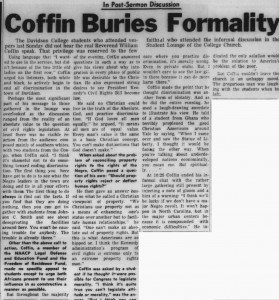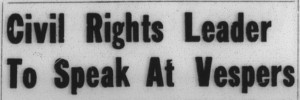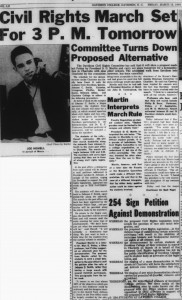This week marks the 50th anniversary of the March on Washington. Davidson College had no direct connection with the march. It didn’t disrupt any classes –they started on September 11th in 1963.
We don’t know if any Davidson students attended. At least one student has written an account of watching the march on television and wishing to be there.* But the college was not isolated from national events and the August 28th march inspired a March 1964 march in Charlotte.
Early in the fall 1963 semester, William Sloane Coffin, Jr., chaplain at Yale University and one of seven Freedom Riders arrested in Montgomery, AL in 1961, visited campus. He spoke at Vespers and also held an informal conversation with students.

Student editors couldn’t resist making a joke with Coffin’s name – but they took his words seriously
The article reported “Perhaps the most significant part of his message to those gathered in the lounge was overlooked as the discussion ranged from the reality of an absolute value to the question of civil rights legislation. At least there was no visible reaction from the audience composed mainly of southern whites, with two students from the Congo, when Coffin said, ‘I think it is shameful not to do something toward ending discrimination.'”
There was more reaction when the March 14, 1964 march was planned.
The headlines reveal the mixed reactions to the march – and the pressure faced by the student organizers to cancel. The small article on “Martin Interprets March Rule” now reveals how a president under pressure from some Trustees and local politicians found a subtle way to allow the students to carry one. The slightly larger article on “254 Sign Petition” shows that the march had significant opposition within the student body (which numbered 1000 in 1963-64).
For additional insights into this era at Davidson, check out essays written by first-year English students: Integration at Davidson (2001) and Integration at Davidson (2003).
And if you were in Washington on August 28, 1963, Around the D invites you to share it with us.
*Joe Howell, class of 1964, tells his story in Civil Rights Journey: The Story of a White Southerner Coming of Age During the Civil Rights Revolution.


